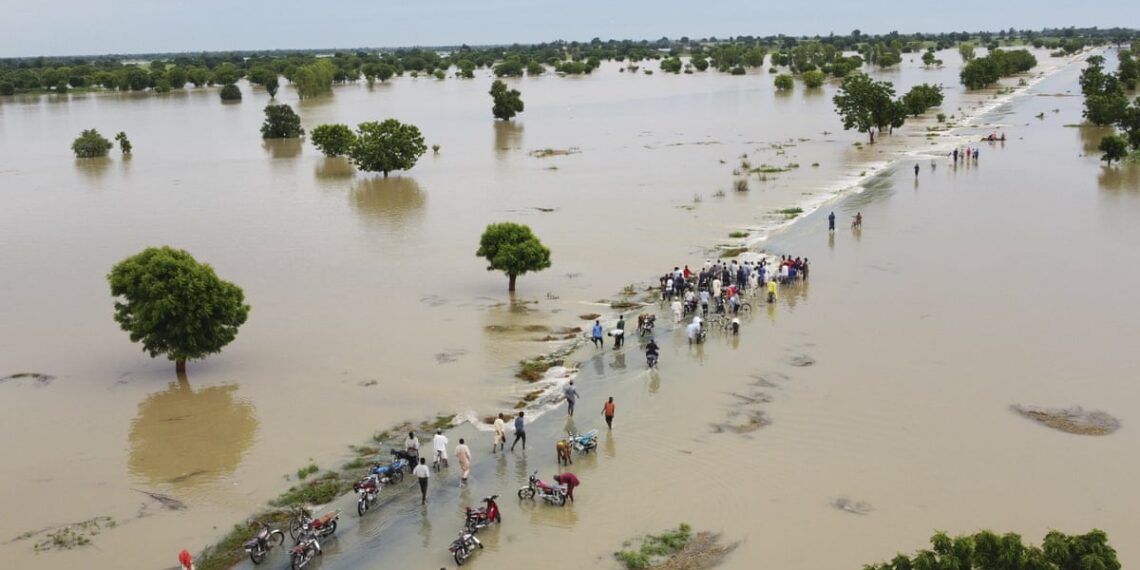News
Flood: UN Announces $10.5m New Funding For Nigeria’s Response

The UN has announced $10.5m new funding for Nigeria’s response.
Eko Hot Blog reports that United Nations (UN) Humanitarian Coordinator for Nigeria, Matthias Schmale, has announced $10.5 million in new funding for the flood response in Nigeria.
EDITOR’S PICKS
-
Nearly 200 Countries Agree On Historic Fund To Help Poor Countries Deal With Climate Disasters
-
PDP Crisis: “I Said You took N1bn” – Wike Dares Ayu To Sue Him
Deputy Spokesperson for the Secretary-General, Farhan Haq, made the disclosure at a news conference at UN headquarters in New York on Saturday.
Haq said that Schmale announced the funding in a statement to support Nigeria as the country faced unprecedented flooding.
“This new funding from the UN Central Emergency Response Fund (CERF) and the Nigeria Humanitarian Fund will provide clean water, sanitation, health care, shelter and non-food items for people in the most affected states.
“This will include people affected in the north-east of the country where people are reeling from the combined impact of floods, protracted conflict, rising hunger and a cholera outbreak,’’ he said.
Meanwhile, Schmale’s statement stated that the funding will also extend to the vulnerable people in the northeast who have already been affected by terrorist attacks.
“The United Nations today released a total of US$10.5 million from the Nigeria Humanitarian Fund (NHF) and the Central Emergency Response Fund (CERF) to provide assistance to people affected and left vulnerable by floods across Nigeria, including those in north-east Nigeria who are already ravaged by conflict,” the statement reads.
“A $5 million NHF allocation will provide much needed water, sanitation, health care, shelter and non-food items support to over 264,000 people in the states of Borno, Adamawa and Yobe (BAY) – covered by the Humanitarian Response Plan 2022 – who are reeling from the combined impact of floods, protracted conflict, rising hunger and a cholera outbreak.
“The NHF funds will complement a $5.5 million CERF rapid response allocation for the states most affected by flooding in Nigeria that will help provide clean water, sanitation, hygiene, emergency shelter and health care assistance for 495,000 people in Anambra, Bayelsa, Kogi, and Niger states. The funds will also help recovery in these states. The allocation will complement ongoing response efforts by the Government of Nigeria and the Nigerian Red Cross/Red Crescent.”
“In my visits to Anambra, Adamawa and Bayelsa, I met and spoke with people who are struggling to put food on the table and to get clean water to drink. Many have no shelter and have lost all their possessions and livelihoods,” Resident and Humanitarian Coordinator Matthias Schmale said.
“What I saw in Bayelsa, which was essentially cut off from the rest of the country, with homes and fields underwater and some people still sleeping on boats, reminded me of the images coming of out of Pakistan several weeks ago.”
According to the latest data by the government, flooding since July has affected more than 4.4 million people across Nigeria.
Over 2.4 million people are displaced, about half of them in Bayelsa alone (1.2 million). More than 660 people have lost their lives.
The floods have also damaged over 650,000 hectares of farmland across the country.
“The massive destruction to food crops will have implications on food security in the immediate term,” Schmale said.
“As flood waters recede, the most urgent priority is to help affected people get back to what is left of their homes and to regain lost assets and livelihoods. Farmers for example, will require seeds and other agricultural support.”
FURTHER READING
-
World Cup 2022: “You Don’t Get Results By Shouting!” FIFA President Slams Qatar’s Critics
-
Alleged Grass-Cutting Fraud: EFCC To Appeal Dismissal Of Case Against Babachir Lawal, Others
-
National Assembly Commission Names Acting Clerk For NASS
More than 19.5 million people in Nigeria were already facing severe food insecurity before the floods, according to the 2022 Cadre Harmonisé food security and nutrition assessment.
Click to watch our video of the week:
Advertise or Publish a Story on EkoHot Blog:
Kindly contact us at [email protected]. Breaking stories should be sent to the above email and substantiated with pictorial evidence.
Citizen journalists will receive a token as data incentive.
Call or Whatsapp: 0803 561 7233, 0703 414 5611

















